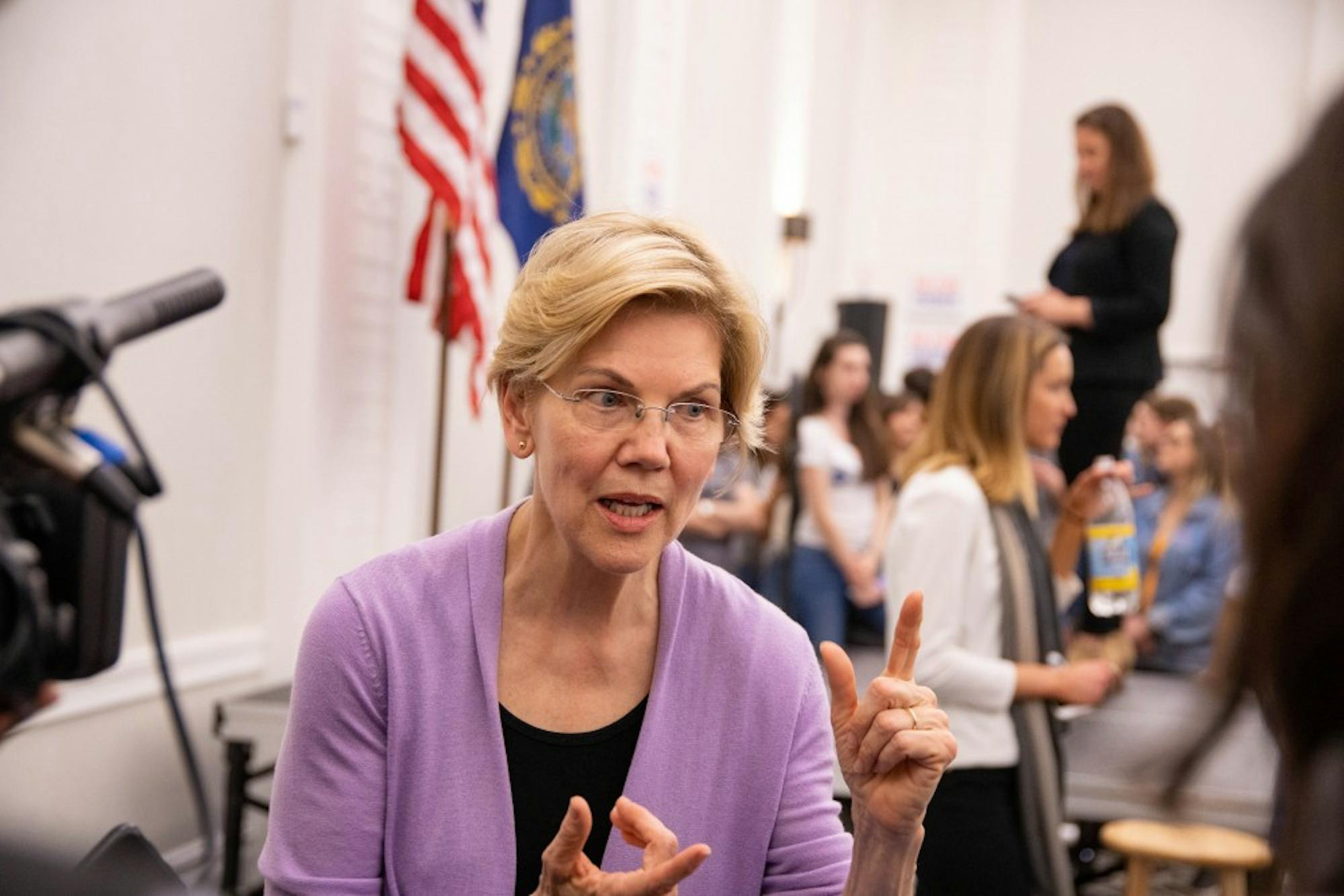Massachusetts senator and Democratic presidential candidate Elizabeth Warren drew a crowd of over four hundred students and local residents for a campaign event at the Hanover Inn on Saturday. In a speech and subsequent question-and-answer session, Warren denounced what she called “corruption” in the economy and Washington, D.C.
The visit to Hanover comes as Warren battles to break out of a historically large field of eighteen major Democratic candidates looking to take on President Donald Trump in 2020. Recent public polling shows that Warren’s support in New Hampshire, currently in the high single digits, puts her in fourth place in the crucial first-in-the-nation primary.
A recent Saint Anselm College poll of New Hampshire voters found that Warren trails former vice president Joe Biden — who has not officially declared a presidential bid — by over a dozen points and lags behind Vermont senator Bernie Sanders, while earning similar levels of support as South Bend, Indiana mayor Pete Buttigieg and California senator Kamala Harris.
To begin the event, Warren gave a synopsis of her life story, emphasizing her Oklahoman roots as the fourth child of parents who held low-wage jobs. She said that when her family was on the verge of bankruptcy, her mother found a minimum wage job that kept their family afloat. The senator asserted that, in contrast to her upbringing, “today, a full-time minimum wage job in America will not keep a momma and a baby out of poverty.”
“That is wrong and that is why I’m in this fight,” Warren said. “Why is it that people who work every bit as hard as my mother worked a generation ago now find the path rockier and steeper?” For people of color, she added, that path is even more difficult.
Warren’s speech included a variety of attacks on individuals and organizations that she said perpetuated a system in which “the government works great for those with money and connections, not great for everyone else.”
“That’s corruption,” Warren said, assailing Wall Street, the Koch brothers, oil and pharmaceutical corporations, major tech monopolies and lobbyists.
The senator framed most major agenda items — climate change, economic inequality, student loans, healthcare — through the idea that “corruption” is at the core of the United States’ problems. She simplified her platform to three prongs: attacking corruption “head-on,” addressing economic inequality and significantly changing the American political system.
Warren said she plans to “attack corruption” by putting an end to lobbying, blocking “the revolving door between Washington and Wall Street,” enforcing a more stringent code of ethics on the Supreme Court and requiring the tax returns of all elected officials.
On economic inequality, the senator pledged to give more power to unions and their members and enact a “wealth tax” to be levied on household assets over $50 million. The new revenue would be used to fund universal childcare and reduce student loan debt with "two trillion left over,” according to Warren. She added that the leftover revenue could be spent on other agenda items, including a “down payment” on a Green New Deal, referencing the divisive proposal put forth by Congresswoman Alexandria Ocasio-Cortez (D-NY) and Senator Ed Markey (D-MA).
Throughout her speech, the senator emphasized her belief that the cost of childcare “sidelines” many parents, and subsidizing “pre-K and pre-pre-K” would strengthen the middle class by allowing parents to ascend professionally.
Warren closed out the policy portion of her speech by outlining the “political change” she hopes to enact as president. According to Warren, this would include protecting the constitutional right to vote, repealing voter suppression laws and overturning the controversial Citizens United v. FEC Supreme Court decision.
References to President Trump were absent from Warren’s speech. Instead, she spoke of systematic problems in the government and economy that obstruct “every change that would help [young people].” Even her call for all individuals running for federal office to release their tax returns online — an indirect jab at the President, who has consistently refused to do so — was contained within her promotion of her own anti-corruption legislation.
Immigration policy, currently a highly contentious issue in the federal government, was also absent from Warren’s speech.
Though Warren must first win the Democratic party’s nomination, for some attendees, the general election was at the forefront of their minds. New Hampshire state senator Martha Hennessey (D-Hanover), who spoke before Warren, said that “everyone in this room is now required to vote in the next election” and that it was crucial that everyone in the room “support whoever it is the Democratic nominee is.”
“We all know how important that is going to be in this election,” Hennessey said. “We have learned our lesson, I hope.”
Michael Gem, a New Hampshire native who lives in Los Angeles and is an undecided voter, echoed Hennessey’s general sentiments, saying that he would vote for anybody who can beat President Trump in 2020.
On Warren, he said that while he is a “big fan of her message,” he is “not sure if she can win.”
Jai Smith ’22, who attended the event, praised Warren’s grasp of policy details, saying that she answered questions “very directly, and with concrete things that she can do.” He added that Warren has been his favorite of the candidates he has seen so far.
Kylie Romeros ’22 said that she appreciated Warren’s emphasis on childcare.
“That’s a really important thing that I hadn’t heard her talk about as much before the event,” Romeros said.
West Lebanon resident Maria Melendy expressed her admiration for the way Warren presented her arguments.
“Off the cuff, she has a memory like a steel trap,” Melendy said. “Her history — she knows what she wants to say, she doesn’t have to look at notes. What she wants to do, what she has done and what she’s struggled through — it’s all very impressive. She gets it.”
With the New Hampshire primary less than a year away, 2020 Democratic candidates are beginning to come in force to Dartmouth. Washington governor Jay Inslee and New York senator Kirsten Gillibrand ’88 recently visited campus, and Harris will be hosting a town hall event in Alumni Hall on April 23.
Their visits are occurring on friendly territory — in recent elections, Hanover has proven to be a reliably Democratic town in a purple state. In the 2016 presidential election, Hillary Clinton received 84.9 percent of the vote in Hanover — her largest percentage of any town in New Hampshire.





